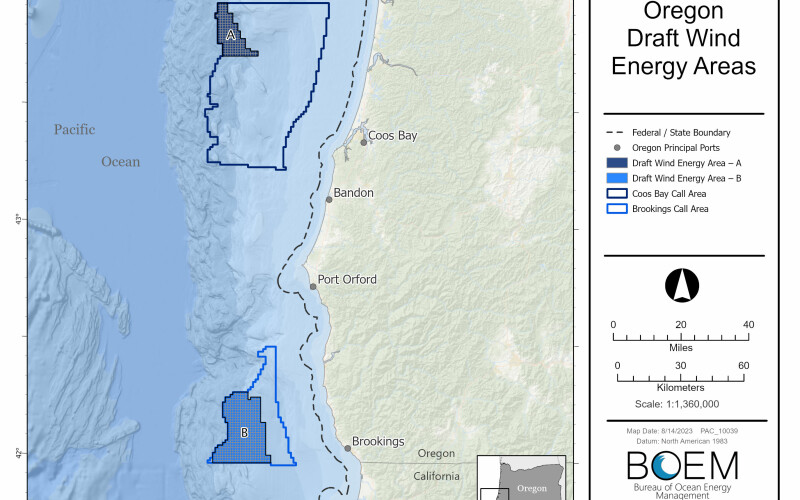A planned auction of Oregon offshore wind leases was postponed Sept. 27 after Gov. Tina Kotek withdrew her state from an agreement with the federal Bureau of Ocean Energy Management.
In a rare victory for wind power critics, BOEM abruptly announced it was “delaying the offshore wind energy auction planned for potential lease areas offshore Oregon due to insufficient bidder interest at this time.”
Governor Kotek effectively torpedoed the auction plan that day with a letter to BOEM Director Elizabeth Klein.
“I believe that Oregon has no choice but to withdraw from the BOEM Oregon Intergovernmental Renewable Energy Task Force in order to ensure that Oregon’s interests are fully protected, and that we have adequate time to complete our state Roadmap with engagement and participation of key constituencies and the public. Given this, I request that BOEM halt all current leasing activities off the coast of Oregon and terminate the current auction,” Kotek wrote.
“My administration must have full confidence that our state’s Roadmap will be complete and all associated enforceable policies in place before BOEM proceeds with additional lease-related activities in future years.”
Kotek’s stance is “much stronger than I expected. Basically abolishing the BOEM task force. I think that’s unprecedented,” said Heather Mann, executive director of the Midwater Trawlers Cooperative, Newport, Ore.
BOEM’s pullback comes after months of pressure from skeptical Oregon leaders, commercial fishing groups and Native tribal advocates. Most recently the agency came under stinging criticism from the Confederated Tribes of the Coos, Lower Umpqua and Siuslaw Indians, with a lawsuit seeking to block the Coos Bay and Brookings lease sales planned for October.
“Coastal tribes have repeatedly met with BOEM urging BOEM to take its time to develop wind energy in a way that does not adversely impact Tribes and the resources which they depend on,” said Tribal Council Chair Brad Kneaper. “BOEM has repeatedly disregarded these requests, telling the Tribes that wind energy development is being driven by the White House.”
According to BOEM, only one of five companies that qualified for the sale stated interest in bidding. “I think all of that could have damped down the interest in bidding here,” along with the potential for prolonged court challenges, said Mann. “We knew that the litigation would be tough, a lot of people have tried this in other places.”
Mann said opponents of the lease sale have been working to bring in potential allies – including environmental groups that support renewable energy, but still have concerns about its potential effects on coastal environments and communities.
Nick Edwards, a fisherman from Coos Bay with the Midwater Trawlers group, stressed the skeptics are seeking “the Oregon Way” of consensus building: “the Oregon Way has time and time again been the bellwether for successful development in our State.”
Native tribes have asserted that BOEM officials are operating under pressure from Washington to move the planning process forward. Kotek’s pointed missive to the agency leadership underlined that.
“I am disappointed that BOEM’s accelerated process over the last year has further divided stakeholder communities, and put the Confederated Tribes of the Coos, Lower Umpqua and Siuslaw Indians in the position of challenging BOEM in federal district court,” Koteck wrote.
“Oregon’s legislative Coastal Caucus is likewise now in full opposition to BOEM’s proposed lease. My office has heard broader concerns this month from renewable energy, labor, fishing, and conservation communities on the risks that a failed competitive lease process would pose to Oregon’s developing supply chain industry and to its environmentally sensitive offshore habitats.”
The Oregon BlueGreen Alliance said it will work with other groups to move wind energy forward.
“Offshore wind continues to be a critical opportunity for Oregon to meet its 100% clean energy goals by 2040, address climate change, and provide economic opportunities for Oregon workers and businesses,” said Ranfis Villatoro, BlueGreen’s Oregon senior state policy manager.
“However, building large renewable energy infrastructure takes time and Oregon owes it to its communities and coastal ecosystem to do it the right way. We look forward to working with other stakeholders—including Tribes such as the Confederated Tribes of the Coos, Lower Umpqua and Siuslaw Indians—on the Offshore Wind Energy Roadmap, while additionally supporting regional conversations on workforce and supply chain opportunities to advance union jobs and support economic development in Oregon.”







